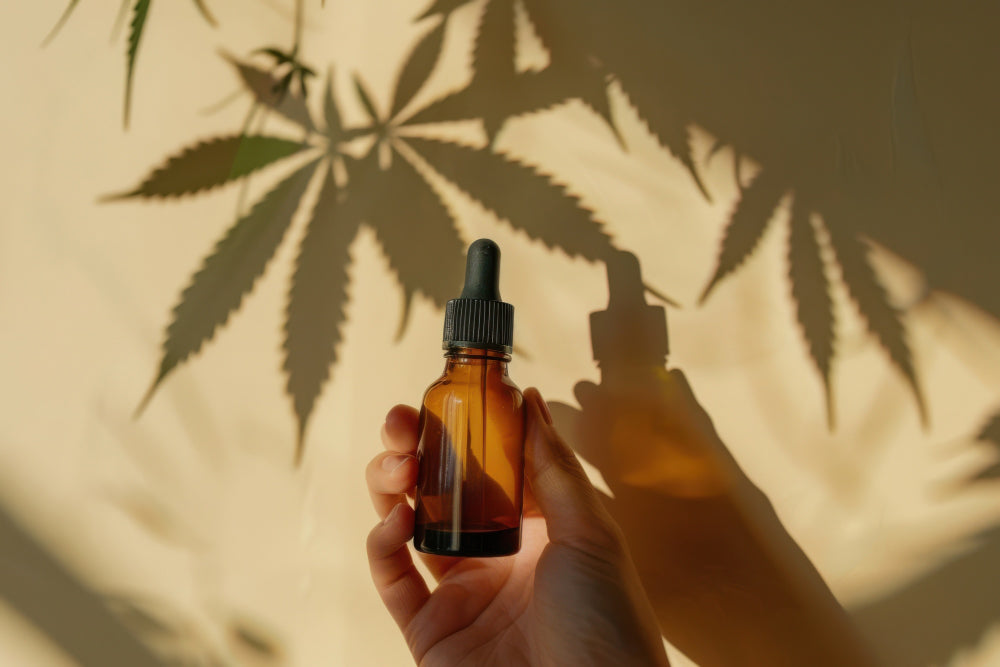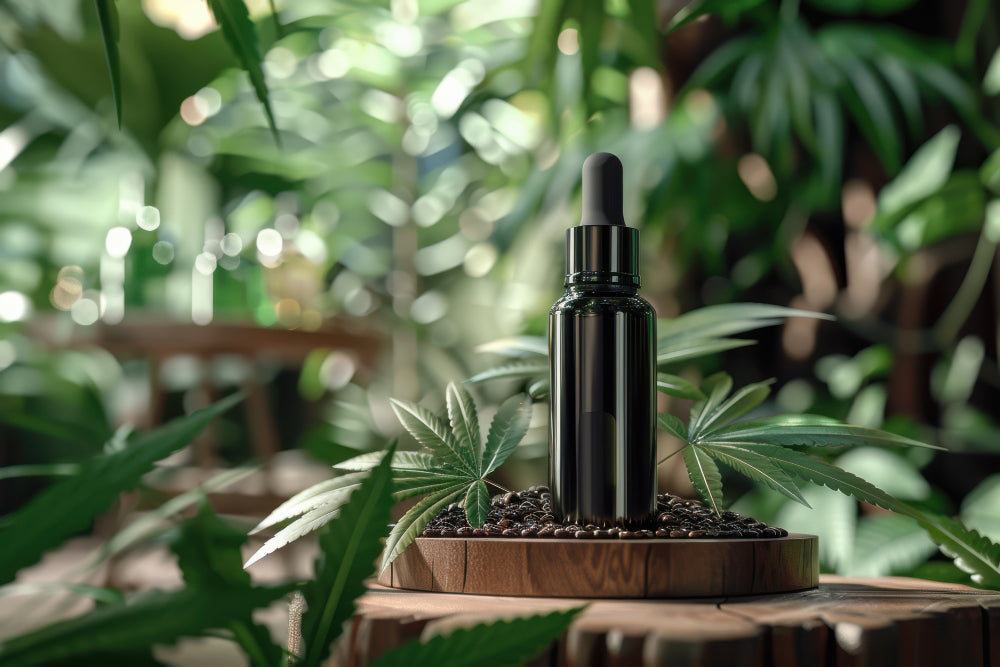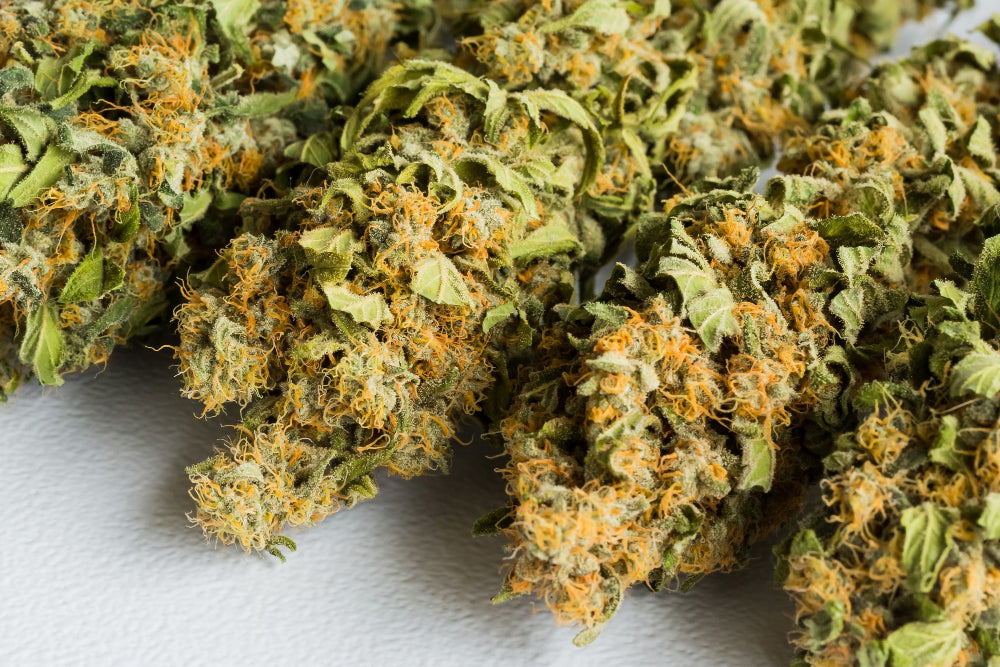In recent years, CBD oil has become one of the most sought-after natural products, especially among people interested in the health benefits of cannabis. This oil, extracted from the flowers and leaves of the hemp plant, has numerous beneficial properties that make it a popular choice for those seeking a natural alternative to conventional medications. CBD oil is valued for its potential calming, anti-inflammatory, and pain-relieving effects, and there are a growing number of scientific studies confirming its effectiveness in various areas.
One particularly interesting application for CBD oil is supporting the nervous system. In a world increasingly characterized by stress and hectic pace, many people are looking for ways to calm their nerves and find inner balance. CBD oil offers a natural way to address these challenges without resorting to chemical sedatives. It's not just its relaxing effect that makes CBD oil so appealing, but also its ability to promote overall well-being.
In this article, you'll learn everything you need to know about CBD oil, its effects on the nervous system, various uses, and how it compares to other natural sedatives. We'll also take a look at the latest scientific findings to give you a comprehensive understanding of CBD oil. Our goal is to provide you with the information you need to make informed decisions about using CBD oil in your everyday life.
What is CBD oil?
CBD oil is a natural extract derived from the hemp plant. It contains cannabidiol (CBD), a cannabinoid that has no psychoactive effects and therefore doesn't cause a "high," unlike tetrahydrocannabinol (THC). CBD interacts with the human endocannabinoid system, which plays a key role in regulating functions such as sleep, pain perception, immune system responses, and mood. This interaction is what gives CBD its diverse health benefits.
CBD oil is extracted from special hemp varieties that are particularly rich in CBD and low in THC. Extraction is typically performed using CO2 extraction, a process considered particularly gentle and ensuring that all of the plant's essential components are preserved. The resulting substance is then dissolved in a carrier oil, typically hemp, MCT, or olive oil, to create a product that is easy to dose and ingest. Depending on the manufacturing process and the plant's origin, CBD oil can be offered in varying concentrations and purities.
CBD oil has now firmly established itself in the wellness and health industry and is used both to relieve acute symptoms and to support long-term well-being. It is particularly appreciated by people looking for a natural alternative to conventional medications to relieve stress, anxiety, or chronic pain. Furthermore, CBD oil is also used preventively to promote general well-being and strengthen the immune system.
Effect of CBD oil on the nervous system
The human nervous system is a complex and finely tuned network responsible for the control and coordination of all physical and mental functions. It consists of the central nervous system (brain and spinal cord) and the peripheral nervous system, which encompasses the rest of the body. Stress, anxiety, and other strains can significantly impair this system, manifesting in a variety of symptoms such as insomnia, irritability, concentration problems, and physical ailments.
CBD oil offers a natural way to support and calm the nervous system. It acts on the endocannabinoid system (ECS), an essential regulatory network in the body that plays a key role in maintaining internal balance. The ECS influences numerous physiological processes, including the regulation of mood, pain, appetite, and sleep. Through its interaction with the cannabinoid receptors in the ECS, CBD oil can calm the nervous system and modulate the body's stress response, leading to an overall feeling of calm and relaxation.
In this section, we'll delve deeper into how CBD oil affects the nervous system by acting on the endocannabinoid system and regulating the release of stress hormones. These mechanisms are crucial to CBD's ability to relieve stress and anxiety and promote overall well-being. By better understanding these processes, you can better appreciate how CBD oil can work in your life.
The endocannabinoid system
The endocannabinoid system (ECS) is one of the most important regulatory systems in the human body. It was only discovered in the 1990s, but has emerged as a central element in maintaining balance (homeostasis) within the body. The ECS consists of endocannabinoids produced by the body, cannabinoid receptors (mainly CB1 and CB2), and enzymes that break down these endocannabinoids. Together, these components work to control a variety of physiological processes, including mood, sleep, appetite, pain perception, and immune responses.
CBD affects the ECS in several ways. It doesn't bind directly to the CB1 and CB2 receptors like THC does, but rather modulates the activity of these receptors by increasing or decreasing their sensitivity. Furthermore, CBD prevents the breakdown of anandamide, one of the body's most important endocannabinoids, which can lead to higher anandamide levels and, thus, improved mood and a general sense of well-being. This indirect effect of CBD allows the body to naturally restore balance without directly overstimulating the receptors.
Another important aspect of the ECS is its role in stress management. Studies have shown that the ECS plays a pivotal role in regulating the stress response by modulating the release of cortisol, the main stress hormone. By supporting the ECS, CBD can help dampen the body's stress response and minimize the effects of chronic stress. This makes CBD an attractive option for people looking for natural ways to improve their stress management and calm their nerves.
How CBD relieves stress and anxiety
Stress and anxiety are among the most common complaints affecting people today. Whether triggered by work-related pressures, personal challenges, or environmental factors, chronic stress can place a severe strain on the nervous system and lead to a variety of health problems. CBD oil offers a natural and well-tolerated way to alleviate these stressors by directly targeting the underlying biological mechanisms that cause stress and anxiety.
One of the main effects of CBD on the body is its ability to regulate the release of cortisol. Cortisol is a hormone produced in the adrenal glands that plays a key role in the stress response. During acute stress, the release of cortisol is necessary to prepare the body for "fight or flight." However, during chronic stress, cortisol levels remain constantly elevated, which can lead to numerous negative health effects, including elevated blood sugar levels, sleep disturbances, and a weakened immune system. CBD can help lower cortisol levels, thus reducing the effects of chronic stress.
In addition, CBD influences the serotonin system in the brain. Serotonin is a neurotransmitter often referred to as the "happy hormone" because of its significant role in regulating mood and well-being. An imbalance in the serotonin system is often associated with anxiety disorders and depression. CBD binds to the 5-HT1A receptors, a subset of serotonin receptors, and can thus increase serotonin activity. This leads to improved mood, reduced anxiety, and a generally more relaxed response to stress.
Overall, CBD offers a promising, natural solution for stress and anxiety relief, which can be used both preventatively and for acute symptoms. Unlike many conventional sedatives, CBD does not cause addiction or severe side effects, making it a safe and sustainable option for long-term use.
Possible uses of CBD oil
CBD oil is an extremely versatile product that can be used in a variety of ways, depending on individual needs and preferences. It is suitable for both preventative use to promote general well-being and for acute relief from stress, anxiety, or physical ailments. In this section, we will discuss the most common uses and dosage recommendations for CBD oil.
The correct dosage is crucial for the effectiveness of CBD oil. Since every body reacts differently to CBD, there is no one-size-fits-all dosage. Instead, users should find their ideal dose gradually. It is advisable to start with a low dose and slowly increase it until the desired effect is achieved. The method of ingesting CBD oil also plays a role. There are various intake methods that can be chosen depending on the situation and preference.
Dosage recommendations
The dosage of CBD oil is a key aspect that determines the success of its use. Since CBD affects different people differently, it is important to individually adjust the correct dosage. Factors that influence the ideal dosage include body weight, metabolism, the severity of symptoms, and the desired intensity of the effect. A general recommendation is to start with a low dose of approximately 5 to 10 milligrams per day and gradually increase it until the desired effect is achieved.
For beginners, it may be helpful to choose a low-potency CBD oil and initially place one or two drops under the tongue each morning and evening. Sublingual administration ensures rapid absorption through the mucous membranes, allowing you to feel the effects within 15 to 30 minutes. Those using CBD to relieve acute symptoms, such as stress or anxiety, should adjust the dosage accordingly and increase it as needed. It's important to pay attention to your body's reactions and adjust the dosage if necessary.
For chronic conditions such as anxiety or sleep disorders, it may be beneficial to maintain a constant dosage over a longer period of time to ensure a continuous effect. Since CBD oil is non-addictive and well-tolerated, it can be safely taken over extended periods. However, it is advisable to regularly review the dosage and, if necessary, adjust it in consultation with a doctor to achieve the best possible results.

Different forms of intake
CBD oil offers a variety of intake methods, depending on personal preferences and specific needs. The best-known and most widely used method is sublingual administration, in which the oil is placed under the tongue and held there for approximately 60 seconds before being swallowed. This method allows for rapid absorption of the active ingredient through the oral mucosa and ensures a rapid onset of action. Sublingual administration is particularly convenient for people who need a quick and reliable effect, for example, in acute stress situations.
Another popular form of consumption is CBD capsules. These offer the advantage of allowing precise dosing and are easy to integrate into everyday life. Capsules are tasteless and ideal for those who don't like the earthy taste of the oil. They are also discreet and can be easily taken anywhere. While the effect takes longer to take than with sublingual administration, it lasts longer, making them particularly suitable for long-term use.
For people who want to use CBD externally, there are also topical products such as creams, ointments, and lotions that are applied directly to the skin. These products are ideal for treating localized conditions, such as muscle and joint pain or skin irritations. CBD is absorbed directly into the affected area, delivering its effects exactly where it's needed. Topical products are a good complement to taking CBD oil orally and offer an additional way to reap the diverse benefits of CBD .
CBD oil compared to other natural sedatives
While CBD oil offers many benefits, it's not the only natural remedy that can be used to calm the nerves. For centuries, people have turned to herbal remedies to reduce stress and find inner peace. In this section, we'll compare CBD oil with two of the most well-known natural sedatives: valerian and lavender. Both plants are known for their calming properties and have a strong tradition in traditional medicine. But how do they compare to CBD oil?
CBD vs. Valerian
Valerian is one of the best-known herbal sedatives and has been used for centuries to treat sleep disorders and nervousness. The root of this plant contains various compounds that have a calming effect on the central nervous system. Commonly taken in the form of tea, capsules, or drops, valerian is particularly known for its ability to reduce the time it takes to fall asleep and improve sleep quality. However, although valerian is effective for treating sleep problems, it does have some drawbacks, particularly its sedative effect, which can lead to daytime sleepiness in some people.
In comparison, CBD oil offers a broader range of effects. While valerian is primarily used as a sleep aid, CBD oil can have both calming and anxiolytic effects without having a sedative effect. This makes it particularly attractive for people who need relief from stress and anxiety during the day while still wanting to remain clear-headed and alert. Another advantage of CBD is that it doesn't cause addiction with long-term use, whereas valerian can. Overall, CBD oil offers a more versatile and sustainable option for calming nerves.
CBD vs. Lavender
Lavender is another plant long valued for its calming properties. Lavender's pleasant scent is often used in aromatherapy to reduce stress, elevate mood, and promote sleep. Lavender oil can be inhaled directly, vaporized in a diffuser, or applied topically. In addition to its calming effects, lavender also has anti-inflammatory and antimicrobial properties, making it a popular skincare product. Despite its wide range of uses, however, lavender has some limitations, particularly regarding its effectiveness for severe anxiety or chronic stress.
CBD oil, on the other hand, offers a more direct and profound effect on the nervous system. While lavender works primarily through its scent and relaxing effects, CBD interacts directly with the endocannabinoid system, thus influencing fundamental biological processes that regulate stress and anxiety. This makes CBD oil a more effective option for treating serious nerve-related conditions. Furthermore, CBD oil is more versatile and can be used both internally and externally, whereas lavender is primarily limited to its aromatic properties.
Scientific findings on CBD oil
The increasing popularity of CBD oil has also piqued the interest of scientists. Numerous studies have been conducted in recent years to investigate the mechanisms of CBD and confirm its potential health benefits. These research findings are particularly important for people seeking scientifically sound information before incorporating CBD oil into their health routine. In this section, we'll highlight some of the most important scientific studies on CBD oil, particularly regarding its effectiveness in treating anxiety and stress.
Studies on effectiveness in nervousness
Several scientific studies have investigated the effectiveness of CBD oil in relieving nervousness and anxiety. One of the most well-known studies was conducted in 2011 at the University of São Paulo, which examined the effects of CBD on social anxiety. Participants suffering from social phobia received either CBD or a placebo before giving a public speaking session. The results showed that the group receiving CBD experienced significantly less anxiety and discomfort than the placebo group. This study provides strong evidence that CBD can be an effective natural alternative for treating anxiety.
Another study published in 2019 examined the effects of CBD on patients with generalized anxiety disorder (GAD). Participants received a daily dose of 25 mg of CBD for a period of one month. At the end of the study, most participants reported a significant reduction in their anxiety levels and improved sleep quality. These results confirm the anxiolytic (anxiety-relieving) properties of CBD and support its use as a complementary therapy for anxiety disorders.
Research findings on stress management
Scientific research also shows promising results regarding stress management. A study published in 2020 in the Journal of Psychopharmacology examined the effects of CBD on stress levels in healthy volunteers. Participants were exposed to a stressful situation, and their cortisol levels and heart rate were measured after taking CBD. The results showed that CBD significantly reduced both cortisol levels and heart rate, indicating a calming effect on the nervous system.
Furthermore, animal studies have shown that CBD has the potential to modulate the body's stress response by reducing activity in the amygdala, an area of the brain responsible for processing fear and emotional reactions. These studies suggest that CBD oil can not only help reduce stress in the short term, but may also contribute to improving stress resilience in the long term. These findings make CBD oil a promising option for people who regularly face stressful situations and are seeking natural support for their nervous system.
Conclusion and purchase recommendations
CBD oil offers a natural and effective way to combat stress and anxiety and promote overall well-being. It has a wide range of uses and can be used both preventatively and for acute relief of symptoms. However, before purchasing a CBD product , it's important to consider a few key aspects to ensure you receive a high-quality and safe product. In this final section, we'll summarize what to look for when purchasing CBD oil and provide practical tips for finding the best products on the market.
What should you look for when buying CBD oil?
When purchasing CBD oil, there are several important factors to consider to ensure you're getting a high-quality product. First and foremost, the origin of the hemp is crucial. High-quality CBD oil should come from organically grown hemp that's free of pesticides, herbicides, and other harmful chemicals. This information should be communicated transparently by the manufacturer, ideally with documentation of the origin of the raw materials. Also, make sure the hemp comes from regions with strict cultivation guidelines, such as Europe or the USA.
Another important aspect is the extraction method. CO2 extraction is considered the gold standard in the CBD industry, as it allows for the gentle and efficient extraction of cannabidiol without leaving behind harmful residues. Products produced using this method are generally of higher purity and quality. Furthermore, the THC content of the CBD oil should be below legal limits to ensure that the product does not produce psychoactive effects. In most European countries, this limit is 0.2%, and in the USA, it is 0.3%.
Finally, make sure the product has been tested by an independent laboratory. These tests, the results of which are often published on the manufacturer's website, provide information about the oil's actual composition, including CBD content, THC content, and possible contaminants. A reputable manufacturer will ensure that these test results are available for every production batch and communicate them transparently.
Quality seals and certificates
Quality seals and certificates are other important indicators of the quality of a CBD oil. They provide assurance that the product has undergone strict controls and meets the highest standards. One important certificate, for example, is the organic seal, which confirms that the hemp was grown without the use of synthetic pesticides or fertilizers. Another recognized quality seal is the GMP (Good Manufacturing Practice) certificate, which ensures that the product was manufactured under hygienic conditions and offers consistent quality.
Additionally, certificates from independent organizations confirming the purity and CBD content of the oil are another plus. These certificates should be clearly visible on the packaging or the manufacturer's website. Some manufacturers also have their products certified by organizations like the European Industrial Hemp Association (EIHA), which sets strict standards for the cultivation and processing of hemp products.
By paying attention to these quality seals and certificates, you can ensure you're purchasing a high-quality CBD oil that's not only effective but also safe. High-quality products may be a bit more expensive, but investing in quality pays off, as you'll receive a product that delivers the desired health benefits while meeting the highest safety standards.







Leave a comment
This site is protected by hCaptcha and the hCaptcha Privacy Policy and Terms of Service apply.